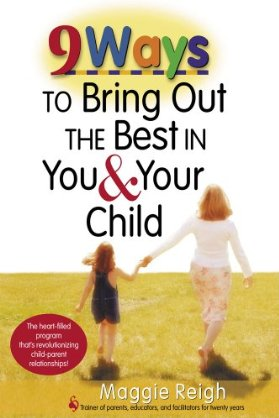 Author: Maggie Reigh
Author: Maggie Reigh
Original Publication: 2004
Started: 2010 Nov 8
Finished : 2010 Nov 23
Format: Paperback
239 pages / 16 days
14.9 pages / day
This book was a gift. The inscription on the inside of the cover says:
“With love to Sam – Hope something here is helpful :-) – Mother – 2007”
So this was from my mom, but at a time well before Alex, so we were talking at the time about parenting a 11 or 12 year old Amy , depending on if this was a Birthday gift or a Christmas gift. But see, I do eventually get to reading books I am given as a gift… even though it may take a few years.
I am generally very suspicious of these sorts of books that tell you how to be a better whatever, be it a better parent or a better manager, or just a better person. It isn’t that they can’t hold nuggets of truth, but rather that many of these things either just come naturally or they don’t, and I am dubious of learning such things from instruction rather than from experience. Having said that, there is always the bonus of actually learning from other people’s experience rather than repeating their mistakes, and I must admit I did end up noting a few things in here where I thought “Yeah, I could do better at that.”
Now, most of the advice, the “9 Ways” are things that might get a “Well duh” reaction from anyone who did not come from a background where the old fashioned disciplinarian “kids will speak when spoken to and do what they are told” sort of style was the norm. At least in the circles I have traveled that sort of thing has been quite rate. To some degree this book comes down to “don’t do that” and instead treat your kids with respect and as people.
To be specific, the 9 “Ways” are:
- The Way of Mutual Respect (Understanding and Respecting Boundaries)
- The Way of Vision (Have an idea of how you would like things to be and evaluate things on if they help get closer to that.)
- The Way of Mutual Empowerment (Turn judgement to curiosity, empower your child to decide things on their own as soon as they are ready and want to.)
- The Way of Emotional Grounding (Staying centered and enabling the draining of frustrations… both yours and the child)
- The Way of Communications (Talk and communicate meaningfully. Listen.)
- The Way of Encouragement (Encourage, be specific, look for the good in things rather than obsessing on flaws)
- The Way of Living Harmoniously with Others (Don’t resolve kid’s arguments, teach them how to resolve them)
- The Way of Loving Discipline (Not punishment, self-control. Help find root causes of misbehavior to find solution.)
- The Way of Parenting with Spirit (Some sort of nonsense about inner lights)
Anyway, as you can see from those titles, there is a lot of fru-fru gobbledegook pop-psychology in here in terms of the terms used to describe various things. And some of the anecdotes also seem like the idealized “yeah, no real person would react quite like that” sort of thing. But they do serve to illustrate the basic principles though. I’ve tried to distill the actual meaningful essence in my parenthetical comments. And I do think once you boil out all the fluff here, the general principles are good ones.
As I mentioned earlier, there were definitely a variety of places where when reading I thought of various interactions I’ve had with Amy (not so much Alex yet) where I could have taken a better path if I’d followed some of the advice in here. In most cases, actually obvious in retrospect, but where in the moment as things happen, perhaps thoughts aren’t as clear. The value of a book like this, as I said, unless you are coming from a strict child-rearing starting place, which I am not, is not so much telling you anything you don’t already know… you know this stuff instinctually… rather it is that it makes you take the time to think about it a bit and raise it to something you are consciously aware of , and therefore perhaps you will be better able to step back and approach things in more healthy ways in situations where perhaps before you might just react and then think “oops, I could have handled that better” after the fact.
Or not. Even when you know a better way, sometimes the moment wins. But it is good to just explicitly think about some of this stuff sometimes.
Wow, oops. I can’t believe I’ve been mostly positive about this book. I *am* skeptical about this kind of book. And a good portion of this book WAS fluff and such, and the last chapter really did start taking a sharp right turn into LaLa Land, but if you pick through all that stuff, the core bits are indeed valuable to spend some time thinking about.